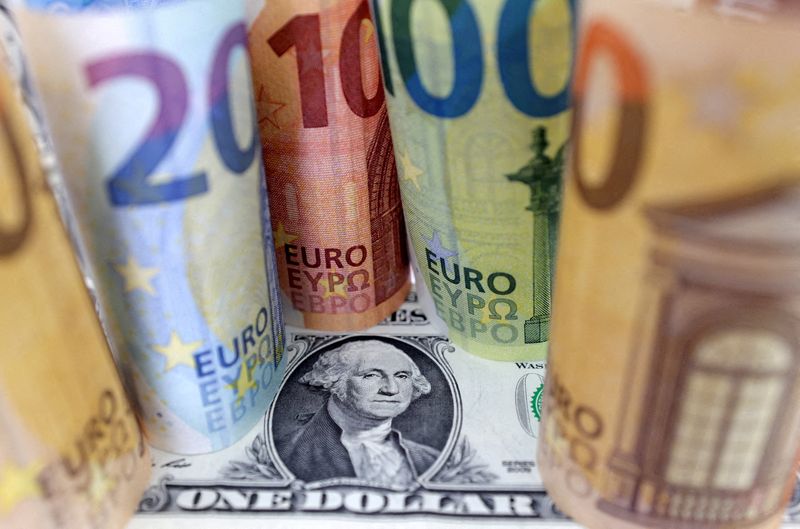By Herbert Lash and Alun John
NEW YORK/LONDON (Reuters) -The dollar fell and the euro rose on Thursday after the European Central Bank raised interest rates as planned despite market chaos in recent days, in a sign the Federal Reserve also will likely raise rates next week as both stay on track to tame inflation.
The two currencies stuck to a narrow range before the ECB announced a half-percentage point rate hike as promised, with markets pricing an 80.5% likelihood that the Fed will lift rates by a quarter point on March 22, CME's FedWatch Tool showed.
U.S. and euro zone government bond yields rose as stock markets on both sides of the Atlantic rallied after an initial volatile trading reaction by markets to the ECB decision.
"The market is looking at the ECB, seeing a central bank facing market uncertainty and taking the hawkish decision that it had hinted at in earlier guidance, being driven by its inflation mandate and saying 'the Fed might be able to follow that similar template,'" said Brian Daingerfield, head of G-10 FX strategy at NatWest Markets.
The ECB has raised rates at the fastest pace on record and the Fed at its quickest in four decades to curb inflation. Higher rates on U.S. government debt than other countries has fortified the dollar, as has a relatively strong economy.
But a rout in global markets after Silicon Valley Bank collapsed in the United States last week and a plunge in the share value of Credit Suisse (SIX:CSGN) this week threatened to upend the ECB's plans to raise rates.
"If they didn't do anything, if there was no hike, people would have been more panicked. They would immediately have started speculating what are they hiding?" said Simona Mocuta, chief economist at State Street (NYSE:STT) Global Advisors in Boston.
"It also gives a sense of continuity in this moment of mayhem. It's a bit of an anchor, as policymakers should be at times like this," she said.
The euro fell as much as 0.25% after the ECB's decision but later reversed course, as did the dollar. The euro was up 0.38% to $1.0615 while the dollar index fell 0.258%.
Currency and other markets were broadly calmer on Thursday after Credit Suisse said it would borrow up to $54 billion from the Swiss National Bank to shore up liquidity and investor confidence.
The bank's shares had plunged as much as 30% on Wednesday.
That stability also helped the Swiss franc to strengthen, and the dollar at one point fell more than 1% against the franc to 0.9232, reversing some of its 2.15% surge on Wednesday - the largest daily gain since 2015.
Elsewhere, the safe-haven Japanese yen remained in favor even as markets calmed a little.
The Japanese yen weakened 0.04% to 133.47 per dollar as the U.S. currency slipped further from a nearly three-month high of 137.91 it hit on March 8.
Sterling was last trading at $1.212, up 0.46% on the day.
Currency bid prices at 3:24 p.m. (1924 GMT)
Description RIC Last U.S. Close Pct Change YTD Pct Change High Bid Low Bid
Previous
Session
Dollar index 104.3600 104.6500 -0.26% 0.841% +104.7500 +104.2000
Euro/Dollar $1.0617 $1.0579 +0.37% -0.91% +$1.0635 +$1.0552
Dollar/Yen 133.4700 133.4750 -0.01% +1.79% +133.8200 +131.7200
Euro/Yen 141.71 141.10 +0.43% +1.00% +141.9200 +139.1500
Dollar/Swiss 0.9289 0.9338 -0.52% +0.47% +0.9339 +0.9233
Sterling/Dollar $1.2122 $1.2056 +0.56% +0.25% +$1.2127 +$1.2029
Dollar/Canadian 1.3724 1.3767 -0.31% +1.29% +1.3787 +1.3722
Aussie/Dollar $0.6656 $0.6622 +0.55% -2.33% +$0.6668 +$0.6612
Euro/Swiss 0.9861 0.9871 -0.10% -0.34% +0.9882 +0.9800
Euro/Sterling 0.8758 0.8770 -0.14% -0.97% +0.8819 +0.8748
NZ Dollar/Dollar $0.6185 $0.6188 -0.02% -2.56% +$0.6188 +$0.6140
Dollar/Norway 10.7570 10.7550 +0.14% +9.74% +10.8710 +10.7250
Euro/Norway 11.4247 11.3739 +0.45% +8.87% +11.4830 +11.3728

Dollar/Sweden 10.5147 10.5835 -0.44% +1.03% +10.6160 +10.4979
Euro/Sweden 11.1625 11.2122 -0.44% +0.12% +11.2473 +11.1440